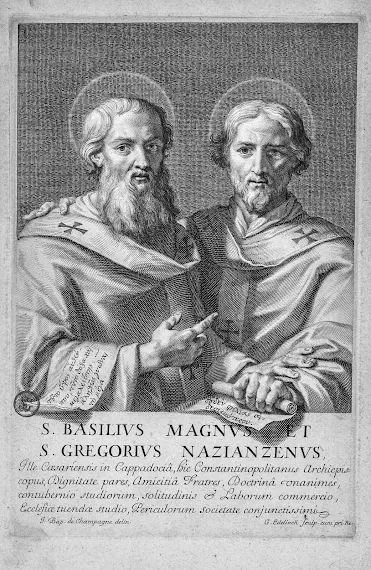Today is the traditional feast of St. Basil the Great. During this time of year when many men are ordained to major orders, it may be beneficial to recall some wisdom from the past—from the Greek Anthologhion printed by Grottaferrata. It is striking how focused St. Basil is on the centrality of the priest's offering of the holy oblation with attentiveness, with the right dispositions of heart, and with care for the canons, including that which prohibits communicating public sinners. St. Basil and Archbishop Cordileone would find conversation easy on this topic. The translation is by a monk of Norcia.
ΠΑΡΑΓΓΕΛΜΑ ΤΟΥ ΜΕΓΑΛΟΥ ΒΑΣΙΛΕΙΟΥ ΠΡΟΣ ΙΕΡΕΑ
Take care, O priest, to present yourself as a laborer without cause for shame who correctly transmits the Word of Truth.
Never prepare to offer Mass while being at enmity with someone, lest you drive away the Paraclete.
On the day you offer Mass, do not judge or quarrel, but remain in the church praying and reading until the time appointed for you to perform the divine mysteries; and stand before the altar with compunction and purity of heart, not glancing here and there, but with fear and trembling stand in the presence of the heavenly King.
Do not rush through your prayers or shorten them in order to please men, and be not an acceptor of persons, but be solely concerned with the King who is present, and the Heavenly Powers who encircle you.
Make yourself worthy of the holy canons. Do not offer worship with those who go astray. Look to him before whom you stand, look to how you perform your priestly duty, and with whom you communicate.
Do not forget the commandment of the Lord and of the holy Apostles. For he says, “Do not give holy things to dogs, or throw pearls before swine.” See that you do not betray the Son of God into the hands of the unworthy. Fear not in that hour the glorious ones of the earth, nor he who wears the diadem. Give freely to those who are worthy of communion, as you have freely received. But do not give communion to those impeded from receiving it by the holy canons.
See that no mouse or vile thing touches the holy mysteries, nor that they not get soaked, or be fouled by smoke, or polluted by profane or unworthy substances.
Observing these and similar things you will save yourself and those who obey you.





















